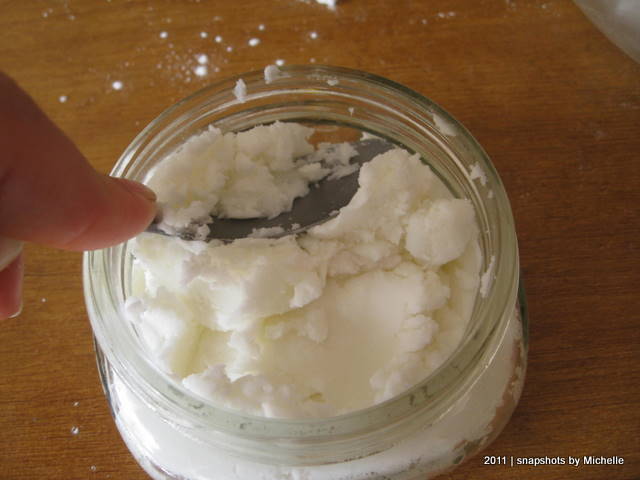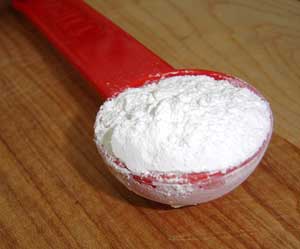In my obsessive quest for true pioneer-lady status and cheapskate, I have come upon a startling little gem: homemade deodorant. It's so easy and cheap, and it works LIKE A DREAM! It is really the best deodorant I've ever used. There are a few problems with it, which I'll talk about, but overall it's quite nice.
So I was spending like, 7-10 bucks on deodorant from the health food store once every couple of months. That seems expensive to me, but I wanted all natural, alum-free deodorant that smelled good, so there you go. I was using men's bay rum deodorant. I forget the brand, but it was in a sleek black container that also enabled me to have a rock and roll-looking bathroom cabinet. Crucial to my lifestyle.
So why would a person not want to use commercial antiperspirants or deodorants? I'm gonna tell you!
Antiperspirants have ingredients that inhibit the secretion of sweat. The ingredient that makes that happen is aluminum zirconium tetrachlorohydrex gly. This chemical caused the skin cells to swell, pinching the sweat glands closed. This decreases the release of sweat. The chemical also absorbs any perspiration that still manages to occur. Aluminum has been found to be a neurotoxin, causing problems in laboratory animals. There have been links to Alzheimer's, but the studies are controversial. Some people also question the wisdom of preventing toxins from leaving the body.
 | ||
| Skin anatomy showing the sweat gland. That cute little curly thing is what gets pinched closed. Seems harsh! |
 |
| Aluminum zirconium tetrachlorohydrex gly! Run away!!! |
Very interesting info from Discovery Fit and Health: here.
The aluminum ions are taken into the cells that line the eccrine-gland ducts at the opening of the epidermis, the top layer of the skin, says dermatologist Dr. Eric Hanson of the University of North Carolina's Department of Dermatology. When the aluminum ions are drawn into the cells, water passes in with them. As more water flows in, the cells begin to swell, squeezing the ducts closed so that sweat can't get out.
Each cell can only draw in a certain amount of water, so eventually, the concentrations of water -- outside and inside the cells -- reach equilibrium. When this happens, the water inside the cell begins to pass back out of the cell through osmosis, and the cell's swelling goes down. This is why people have to re-apply antiperspirant. For those who suffer from excessive sweating, hyperhydrosis, aluminum chloride in high concentrations can prolong the swelling and may ultimately shrink the sweat gland, decreasing the amount of sweat it can produce.
An average over-the-counter antiperspirant might have an active-ingredient concentration of anywhere from 10 to 25 percent. The FDA requires that over-the-counter antiperspirants contain no more than 15 to 25 percent of the active ingredient, depending on what it is. The FDA also requires that all antiperspirants must decrease the average person's sweat by at least 20 percent. For those who have excessive underarm sweating, there are prescription products that contain concentrations higher than those of over-the-counter antiperspirants.
Penetration enhancers such as propylene glycol and disodium EDTA help carry ingredients into the skin. By themselves, these are not considered bad, but they facilitate the absorption of the other nasties into your body.
Triclosan! Triclosan is an antibacterial agent that may really be bad. Studies have shown that this chemical disrupts the endocrine system. It changes the sex of fish! WTH??? It has also facilitated the growth of super bacteria, resistant to the stuff. Bad bad bad. The FDA is investigating this stuff and says that studies are "raising valid concerns." It's in everything, too, from soaps to toothpastes because Americans are becoming real germ-phobes lately.
BHT: Butylated hydroxytoluene is an ingredient used to preserve fats. It's not in every deodorant or antiperspirant, so it's relatively easy to avoid. Some studies have shown a link to nervous system disorders.
And finally, synthetic fragrance! Bad! It smells horrendous and is comprised of undisclosed chemicals. You don't know what you're getting (besides a weird, fake smell that gives me a headache).
So this is why I switched to all natural deodorants to begin with. Honestly, I'm not convinced that all those chemical commercial deodorants are really going to kill anyone; the bottom line for me was the scent. Also the green-ness of the product, which is important to me.
So here's the recipe:
 |
| Coconut oil from Natural Earth Oils. |
1 tablespoon baking soda
1 tablespoon corn starch
2 or 3 drops of the essential oil of your choice

Coconut oil is solid when kept cool and melts to an oil in warmer temperatures. Keep it refrigerated to prevent it from going rancid. It will keep for a long time that way. Let the coconut oil soften for awhile until it's a creamy consistency. Spoon it into your container (I use a plastic cosmetics container that I bought online. You can use glass or PET plastic). Add your baking soda, corn starch, and two or three drops of essential oil and stir.
I use lemongrass essential oil in mine because I'm on a lemongrass kick. Lemongrass can irritate sensitive skin, though, so be careful with it. You can use whatever essential oil you want, really. Tea tree is a great one because it's antifungal and antibacterial. Clary sage, rose, lavender, whatever.
That's it! Just use your finger to smear a bit on. The stuff works GREAT! I haven't found that it stains my clothes at all (don't use too much, though!), and the essential oil scent is mellow, not overpowering. It performs well overall. Really better than any deodorant I have ever purchased. And it's SO FREAKIN CHEAP.
Okay, so here are the problems I'm having with it.
1. If you keep it in the fridge it's too solid to use. You have to scrape it with a knife to get any onto your hands.
2. If you keep it out of the fridge, it melts and separates. You have to stir it up every time you want to use it and the consistency is really problematic. I live in the desert and it's getting warmer and warmer each day. This is becoming quite a hassle for me! It leads to this next issue:
3. I'm finding that the stuff can irritate my underarms if I'm not careful. When the stuff is melted and separated, I stir it with a spoon and then while it's still mixed up I put a little on my finger to apply. If I've gotten too much baking soda on my finger it will irritate the skin. If I've not gotten enough, it doesn't work very well. A difficult balance!
 |
| From Snapshots by Michelle! |
So I guess all three of these issues really relates to keeping the product at the proper temperature so it won't separate and melt. If anyone has any suggestions, I'm definitely open to hearing them. Right now I think the only way to deal with it is to keep it in the fridge and resign myself to the fact that I'll have to scrape it every morning. Probably the best/only solution.
So that issue aside, this is a great product and will save you lots of $$$$$. Good luck, everyone!
MIRI








Have you tried adding some lecithin? That's an emulsifier and natural.
ReplyDeleteI haven't tried that, Suzanne! I have some that I was using for something else. EXCELLENT suggestion. I'll report back later...
DeleteI'll definitely have to try this, I've been wanting to try making my own deodorant! Also thank you so much for recommending that molasses treatment. I did it on Friday and it made my hair feel great!!
ReplyDeleteAwesome!!!!! I couldn't believe it when I first tried the molasses. It's great, right?
Delete